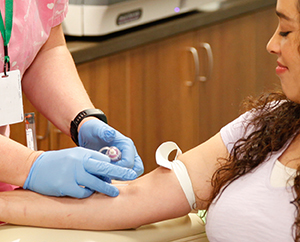For Teens: Understanding HIV/AIDS
HIV weakens the immune system which fights off disease. It spreads through body fluids often passed during sex or through exposure to blood. It can also be spread through infected needles. When HIV starts to cause severe health problems, it’s called AIDS. There’s no cure for HIV or AIDS, but antiretroviral medicines can help control the infection. This treatment lets your body heal some of the damage and stay healthier longer. Many people with HIV are now living a normal lifespan. That's often the case if the infection is found and treated early.

What to look for
A few weeks after HIV is in the body, most people will have symptoms such as:
-
A prolonged fever
-
Sore throat
-
Trouble swallowing
-
Headaches
-
Muscle and joint aches
-
Rash
-
Fatigue
These symptoms may last for a few days to several weeks. They may seem like the flu. So if you’re at risk for HIV, get tested. It’s the only way to know for sure. You can get HIV testing at most health clinics. You can also learn more about testing by calling 800-CDC-INFO (800-232-4636).
Antiretroviral therapy
Antiretroviral therapy is treatment with a number of HIV medicines taken at the same time. These medicines work together to control the virus. They can restore your immune system and prevent future harm to it. An HIV infection can’t be cured. But these medicines can help many people live a normal and active life.
Antiretroviral therapy can also help stop the spread of the virus to others. It works best if the person with HIV is taking the medicines routinely and has an "undetectable" HIV viral load for at least 6 months. If you have HIV and it's been under control for less than 6 months or you are not taking medicines as directed, you need to practice safer sex to protect others. This means using latex or polyurethane condoms during sex. You also need to tell any sex partners about your HIV. Let them know whether you are taking your medicines as directed and if your virus is under control.
If you don’t get treated
Over time, HIV weakens the immune system and many other parts of the body. This makes it easier for you to get sick. You may have:
-
Diarrhea and weight loss
-
Night sweats and fevers
-
Itchy rash
-
Skin sores
-
Memory problems or confusion
-
Swollen glands and white spots in the mouth (thrush)
- Pain and numbness in the toes and fingers
-
Health problems such as pneumonia, blood infections, meningitis, cancers, and kidney failure. Some of these can be life-threatening and lead to AIDS-defining illnesses.
The most common of these are:
- Pneumonia
- Wasting syndrome
- Fungal infection of the esophagus
- Tuberculosis
- Kaposi sarcoma
Stop HIV
Stop what can be the harmful effects of HIV. If you are at risk for HIV, get tested regularly. Screening is advised for all people ages 15 to 65. People younger and older than that who are at high risk should also be screened.
Have only one sex partner at a time, and have that partner commit to only having sex with you. This greatly cuts the risk of spreading HIV and other STIs. The best way to protect yourself and your partner is for both of you to get tested for HIV and other STIs before you start having sex.
Take steps to prevent getting or spreading HIV. Practice safe sex. If you or your partner are not HIV+, consider using pre-exposure prophylaxis (PrEP) and post-exposure prophylaxis (PEP) if needed. These are medicines that help stop the virus from infecting you. Talk with your provider to learn more about these medicines.
If you have HIV, get care right away, Always take your antiretroviral medicines. Use condoms. And if you're living with HIV, tell your partner. Make sure you are not putting that person at risk.